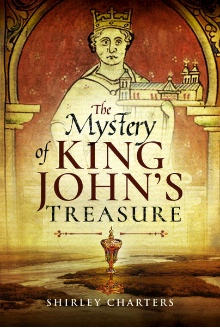The Mystery of King John's Treasure Book Review
Posted: 2018-12-11
In October 1216 King John was hurrying north from King's Lynn to Lincoln in an attempt to quell the ongoing revolt of his leading nobles.
Desperate to reach Lincoln quickly he made a rash decision and attempted to cross the Wash, an area of tidepools and quagmires. It was a foolish decision, for John's royal treasury was lost in the mud, never to be recovered.
At least, that's the traditional story as it has been accepted by historians for centuries. Treasure hunters have been trying unsuccessfully since at least Victorian times to find King John's treasure.
Even today costly projects have been launched using sophisticated geophysical equipment to scan the soft earth in the area of The Wash, where the rivers Witham, Welland, Nene and Great Ouse empty into the North Sea.
All of these attempts to find King John's treasure have been founded on the assumption that the old story is accurate and that the king did indeed rush headlong into disaster and lose his gold, jewels, reliquaries, silver, plate and other royal wealth in the ooze of the tidal Wash.
But is the story true?
Shirley Charters attempts to answer that question is a wonderful little book called The Mystery of King John's Treasure, published by Pen and Sword Books.
It is a fascinating book, and it tackles one of the most intriguing mysteries in English history by going back to the original source material.
And that is where the traditional history of King John's misadventure falls apart. The story of the King's lost treasure really rests upon three chronicles, accounts written by medieval monks, who were the only literary members of society.
Only one of those chronicles is contemporary with the events of 1216, another was written a decade later and the third was written over thirty years after the events of 1216.
Following the narrative of each chronicler is like playing a game of Chinese whispers, where each account becomes more confused and further from the original meaning.
So what do the chronicles say?
The only contemporary chronicle was written by Ralph, the Abbot of Coggeshall in Essex. In it, the Abbot writes one sentence about King John's passage through the Wash. One sentence, for an event of monumental, catastrophic significance? Here is what Ralph has to say:
Moreover the greatest distress troubled him [John] because on that journey he had lost his chapel with his relics, and some of his packhorses with divers household effects at the Wellestream [the Wash], and many members of his household were submerged by the waters of the sea, and sucked into the quicksand there, because they had set out incautiously and hastily before the tide had receded.
Ralph's account sounds very much like John lost a travelling chapel, that is items needed by his priest to conduct mass while on the road. Though no doubt annoying, it is hardly the same as losing his entire treasury.
Writing a decade later Roger of Wendover amended Abbot Ralph's original account, embellishing the 'facts' to say that John lost 'all the wagons, carts, and packhorses, with the treasures, precious vessels, and all other things which he cherished'. Roger adds that 'not a single footsoldier got away'.
The final chronicler is Matthew Paris, who was not even born when King John reigned. Paris embellished the account of King John's loss even more, saying, 'the ground opened up in the midst of the waves, and the sand which is called quick, swallowed down everything, horses and men, weapons, tents, victuals, and all the things which the king valued too highly in the world apart from his life'.
So you can see how each account grew and built upon the last until we have a picture of divine retribution for King John's sins, with the ground opening up and swallowing all his men and his worldly treasure.
One important thing to remember about all these accounts is that they were written by clerics, and King John had a very poor relationship with the church. None of these accounts is objective, and if you look at other writings by the chroniclers it is clear that they were prone to extreme exaggeration to make their point.
What is just as telling as the chronicles, however, is that the household accounts of King John's own clerks have nothing whatsoever to say about the loss of a treasure.
Yet these household accounts were meticulous. The King's clerks recorded everything, catalogued his every expense, every profit and loss. Yet on the subject of his supposed loss of the entire royal treasury, they say not one word. That is perhaps the most telling fact of all.
Reading Shirley Charters book you can only come to one conclusion; that the story of King John losing his treasure in the Wash is just that, a story, embellished by those who had no cause to wish him well, a story that grew into 'fact' with the passage of time.
But if King John did not lose his treasure while crossing the Wash in haste, what happened to it?
Charters makes a reasonably good case that it was removed for safekeeping by the Knights Templar, who were travelling with the King and worked closely with him. Unfortunately, the very name of the Knights Templar is fraught with misconceptions and mixed up in modern reader's minds with conspiracy theories and the rather dramatic 'histories' of writers like Dan Brown (The Da Vinci Code).
But they were, in fact, the closest thing in England to bankers, and were closely linked with King John, especially during the last few years of his reign.
While Charters presents the Templar solution to the mystery of King John's Treasure as if it is fact, I wasn't as convinced by her argument as I was by her meticulous reasoning about the lack of evidence for the traditional accounts of the treasure's loss.
That's a minor point and not a criticism of what is an exceptionally readable and well-researched book. I came away convinced that what I thought I knew about the Mystery of King John's Treasure was completely wrong.
The book reads at times like a novel, rather than a history book. And despite the title, it has a much broader scope than just the events of October 1216. It looks at King John's entire reign, the conflict with his barons that led to the Magna Carta, and the king's upbringing and character. I enjoyed this book enormously and can highly recommend it.
The Mystery of King John's Treasure is available directly from Pen and Sword Books.
<< Hugh Despenser the Younger & Edward II: Downfall of a Favourite | Book Review - Haworth and the Brontes | Book Review >>
Attraction search

